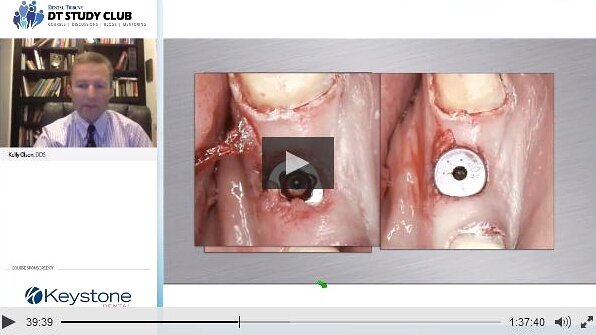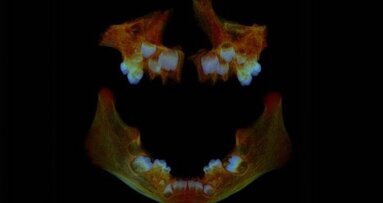LONDON, UK: Electronic learning could enable millions more students to train as doctors and nurses worldwide, according to the latest research. A review commissioned by the World Health Organization (WHO) and carried out by Imperial College London researchers concluded that e-learning is likely to be as effective as traditional methods for training health professionals. These new findings support the approach to continuing education Dental Tribune International (DTI) has adopted with its free online education platform for dental professionals.
The Imperial team, led by Dr Josip Car, carried out a systematic review of the scientific literature to evaluate the effectiveness of e-learning for undergraduate health professional education. They conducted separate analyses on online learning, which requires an Internet connection, and offline learning, delivered via CD-ROMs or USB flash drives, for example.
The findings, drawn from a total of 108 studies, showed that students acquire knowledge and skills through online and offline e-learning as well as or better than they do through traditional teaching.
E-learning, the use of electronic media and devices in education, is already used by some universities to support traditional campus-based teaching or to enable distance learning. Wider use of e-learning might help to address the need to train more health workers across the globe. According to a recent WHO report, the world is short of 7.2 million health care professionals, and the figure is growing.
The authors suggest that combining e-learning with traditional teaching might be suitable for health care training, as practical skills must also be acquired.
According to Car, from the School of Public Health at Imperial, “E-learning programmes could potentially help address the shortage of healthcare workers by enabling greater access to education; especially in the developing world the need for more health professionals is greatest.”
While the study focused on the education of students, DTI follows a similar approach to continuing education, offering webinars via its Dental Tribune Study Club, which it launched in 2009. The platform regularly offers free online courses and in several languages. The wide range of topics includes general dentistry, digital dentistry, practice management, as well as specialties, such as implantology and endodontology. The webinars are presented by experienced speakers and participants are awarded continuing education credits.
LONDON, UK: All dentists know how important vitamin D is for healthy teeth and bones. In a new study, researchers from the University of Sheffield have ...
It would be hard to find two more disparate figures in history than physicist Albert Einstein and American Civil War general Robert E. Lee—who has been ...
Dr Dympna Kavanagh is chief dental officer in Ireland’s Department of Health and chair of the Platform for Better Oral Health in Europe. A specialist in ...
LONDON, UK: Though elite athletes generally possess an enviable level of physical fitness, a recent study has shown that their oral health may leave much to...
CAMBRIDGE, UK: A recent study examined the effectiveness of simulation-based learning in medical education in enhancing healthcare professionals’ ...
BRUSSELS, Belgium: Besides crippling health effects, smoking can cause serious damage to oral health, putting smokers at an increased risk of periodontal ...
GLASGOW, UK: According to research presented at the recent annual National Cancer Research Institute (NCRI) Cancer Conference in Glasgow, 29 per cent of ...
BRIGHTON, UK/ATLANTA, US: The incidence of thyroid cancer and meningioma is increasing globally. New research has found that repeated exposure to dental ...
BRADFORD, UK: Unlike bones, children’s teeth continue to grow during periods of undernourishment and record high nitrogen values, providing a kind of ...
LONDON, UK: More than 30 food industry trade bodies have sent a letter to Michael Gove, the Secretary of State for Environment, Food and Rural Affairs, ...
Live webinar
Tue. 24 February 2026
6:00 pm UTC (London)
Prof. Dr. Markus B. Hürzeler
Live webinar
Tue. 24 February 2026
8:00 pm UTC (London)
Prof. Dr. Marcel A. Wainwright DDS, PhD
Live webinar
Wed. 25 February 2026
4:00 pm UTC (London)
Prof. Dr. Daniel Edelhoff
Live webinar
Wed. 25 February 2026
6:00 pm UTC (London)
Live webinar
Thu. 26 February 2026
1:00 am UTC (London)
Live webinar
Tue. 3 March 2026
4:00 pm UTC (London)
Dr. Omar Lugo Cirujano Maxilofacial
Live webinar
Wed. 4 March 2026
1:00 am UTC (London)
Dr. Vasiliki Maseli DDS, MS, EdM



 Austria / Österreich
Austria / Österreich
 Bosnia and Herzegovina / Босна и Херцеговина
Bosnia and Herzegovina / Босна и Херцеговина
 Bulgaria / България
Bulgaria / България
 Croatia / Hrvatska
Croatia / Hrvatska
 Czech Republic & Slovakia / Česká republika & Slovensko
Czech Republic & Slovakia / Česká republika & Slovensko
 France / France
France / France
 Germany / Deutschland
Germany / Deutschland
 Greece / ΕΛΛΑΔΑ
Greece / ΕΛΛΑΔΑ
 Hungary / Hungary
Hungary / Hungary
 Italy / Italia
Italy / Italia
 Netherlands / Nederland
Netherlands / Nederland
 Nordic / Nordic
Nordic / Nordic
 Poland / Polska
Poland / Polska
 Portugal / Portugal
Portugal / Portugal
 Romania & Moldova / România & Moldova
Romania & Moldova / România & Moldova
 Slovenia / Slovenija
Slovenia / Slovenija
 Serbia & Montenegro / Србија и Црна Гора
Serbia & Montenegro / Србија и Црна Гора
 Spain / España
Spain / España
 Switzerland / Schweiz
Switzerland / Schweiz
 Turkey / Türkiye
Turkey / Türkiye
 UK & Ireland / UK & Ireland
UK & Ireland / UK & Ireland
 International / International
International / International
 Brazil / Brasil
Brazil / Brasil
 Canada / Canada
Canada / Canada
 Latin America / Latinoamérica
Latin America / Latinoamérica
 USA / USA
USA / USA
 China / 中国
China / 中国
 India / भारत गणराज्य
India / भारत गणराज्य
 Pakistan / Pākistān
Pakistan / Pākistān
 Vietnam / Việt Nam
Vietnam / Việt Nam
 ASEAN / ASEAN
ASEAN / ASEAN
 Israel / מְדִינַת יִשְׂרָאֵל
Israel / מְדִינַת יִשְׂרָאֵל
 Algeria, Morocco & Tunisia / الجزائر والمغرب وتونس
Algeria, Morocco & Tunisia / الجزائر والمغرب وتونس
 Middle East / Middle East
Middle East / Middle East


















































To post a reply please login or register